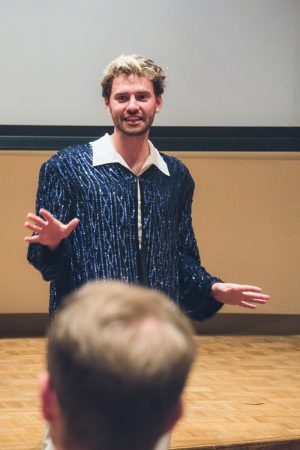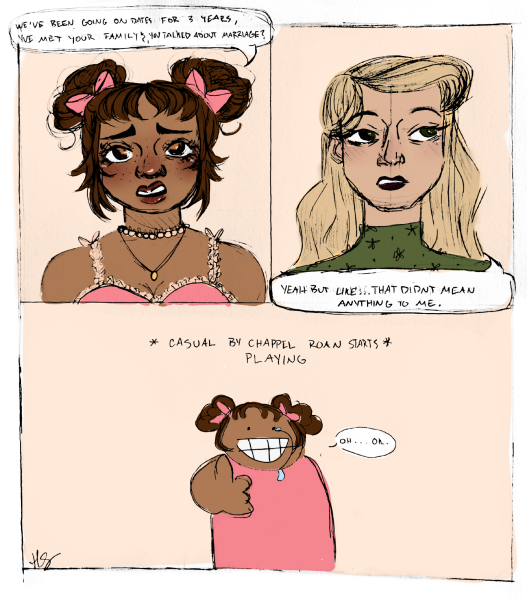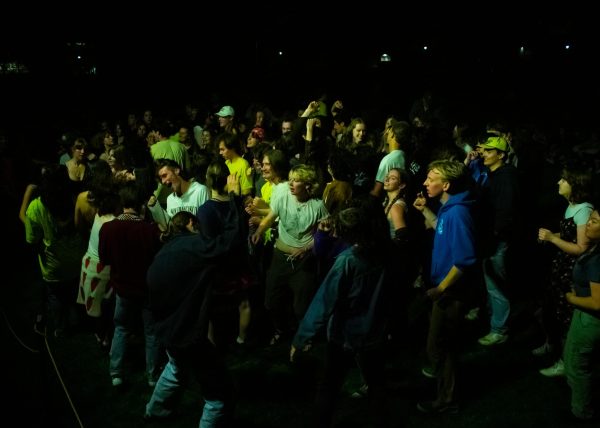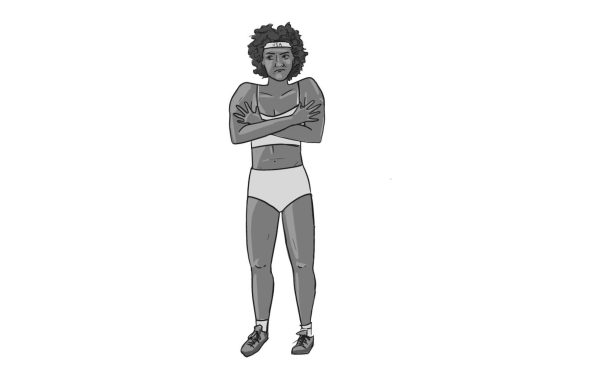Q&A: Gender-Drifting in “River”
May 3, 2019
I sat down with Brendan Dunlap, recipient of the David Nord Award, to talk about his short film “River.” This award presented annually in honor of alumnus David Nord for his work on AIDS-related advocacy, provides funding for a creative project centered around challenges pertinent to queer communities.

Brendan Dunlap ’19 is the recipient of the David Nord Award and recently directed a short film called, “River.”
RA: Tell me the general gist of your project?
BD: I have made a short film entitled “River” for the David Nord award and the film is about a gender non-conforming artist who gets back into art and is faced with questioning their own motivations and eventually take a lesson they’ve learned through their gender identity and apply it to another arena of their life. Going into the project I wanted to emphasize a positive spin on gender rather than portray it as a mountain to be overcome or climbed but as something that can lend itself to a fresh perspective on other areas of your life.
RA: And who are the actors in the film?
BD: Dan Lovato is a former Whitman student and they are gender non-conforming which is important for me in casting this role, making sure that gender non-conforming actors were portraying their own stories. Dan as River, and Christian Bailey is a freshman here.
RA: Could you tell me about the award itself?
BD: I stumbled upon the award just looking for the LGBTQ group. I was racking my brain trying to remember what the name was, and it was right on the tip of my tongue so I just Googled it and then in that search, I just found this page talking about the David Nord award and I’d never heard of it really and upon reading a bit about it, I knew that I had to apply, not knowing what I would do. I knew I had to apply because it was such a unique opportunity for a queer project to be funded. That’s the dream.

RA: Could you tell me about the title, “River”?
BD: The title is the character’s name, River. The name actually never comes up in the film itself, but the name was inspired by the idea of gender-drifting or gender-drifters which I something that I, in many ways, identify with and I think could be seen as an umbrella term similar to genderqueer in a sense where there’s no one way to pin it down, it’s just gently drifted from some sort of land point or anchored point. I love the connotations behind the term gender-drifter because it is gentle yet intentional and involves a little bit of trust in yourself to drift away from something that’s sturdy and feels secure.
RA: How do you think that the medium of film has allowed different parts of the story to come alive?
BD: I use the film medium in order to say a lot without actually saying much so there aren’t too many lines directly about gender specifically, because that’s actually, at the heart of it, not what the film is about. It’s about an artist, but I use visual cues to hone the audience into gender indicators which I hope add to the sense of the character.
RA: What were your biggest challenges with this piece?
BD: I will say along the way that pressure definitely was felt internally and time and other sources of occasional disruption to flow. Making a film is a very involved process. There’s a lot of components that go into it and it’s just my first time doing a project where I was the only one directing and writing and editing and all the logistical components — producing. Embodying all of those different roles at one time while having also this grander vision of what I was trying to create was a task, and I learned a lot.
RA: What sort of impact do you hope that this film has on different communities?
BD: One of the hopes that I have, not just for this project but in general is to see a larger diversity of narratives that are portrayed and ones that have gender non-conforming people or trans people where the story isn’t focused on that identity, but is just one of many components of this character’s life, so I hope that this film can be a tiny, tiny slice of a larger shift towards just a more general inclusion.










Bob Dunlap • May 6, 2019 at 5:18 pm
I am so proud of my son, Brendan, for winning the award and making the film, which I am eager to see. Granted, I may be biased, but I am confident it will be a tour de force.
Bravo!